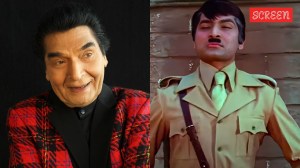My music, my money
In a musical world where remixes, cover versions and pop adaptations areincreasingly acceptable, one was a bit surprised at the prospect o...

In a musical world where remixes, cover versions and pop adaptations areincreasingly acceptable, one was a bit surprised at the prospect of ameeting called to discuss the “Performer’s Rights in the context of NorthIndian Classical Music”. Participation of representatives from differentmusic-related disciplines (artistes, accompanists, organisers, recordcompanies, archivists and legal experts) made the September 14 morning evenmore special. More so since maestros like Pandit Shiv Kumar Sharma were notin the `no-comments’ reserved row, but seated right on the dias.
Delhi High Court lawyer Chander Lall (who runs the risk of turning amusician during his study of Indian Copywright Act in the august company ofclassical singers and tabla players), started the discussion on a high note.
He explained the wide legal definition of a performer which includes even asnake charmer, lecturer and acrobat. Lall informed that although written andoral permission of the performer in the event of any kind of audio andvisual recording of the performance is necessary, the rule book is hardlybeing followed. Naturally, problems have arisen from the unauthorisedrecording and sales of live performances of Indian classical musicians. Lallsaid the lack of awareness has made many musicians vulnerable toexploitation at the hands of record companies, music circles-organisers,archivists and not to forget the music fans as well.
“Music festivals, concerts and even private mehfils are recorded byorganisers and sound system recordists without taking prior permission. Theperformer comes to know of it only when an album/casette/cd is released.
Therefore, this meeting aims to sensitise artistes about the possibilitiesof rights violation.” Lall said the music fans also need to understand theconcept of copywright. “If you have bought a casette of your favouritesinger/instrumentalist, remember you are the owner of only the casette, notthe copywright over it. Therefore, any public use of the performer’s musicis not allowed. Playing the music aloud at a baraat may find you in trouble.
It is another story that no one cares in India,” he lamented, adding thatrestaurants, airlines, showrooms have to take prior permission before usingrecorded music, classical or film-oriented.
After Lall, it was the turn of classical singer Shubha Mudgal to alarm theaudience. She recalled various concerts in which she was not told about theaudio-video recording of her performance. “The show organisers beleive thatit is their birthright to record the performance. They claim the recordingis for their archives. However, one does not know if the physical space forsuch archives actually exists,” she recounted, adding that many musiccircles later sell the recordings to music stores or record companies at anattractive price. Mudgal said she could produce documentary evidence(receipts) of sale of surreptitious recordings in big and small cities.
Apart from the main artistes, Mudgal presented the predicament of theaccompanying artists. “More than often the record companies approach themain artiste for permission. However, very few artistes feel it necessary toacknowledge the names of their tabla/tanpura/sarangi accompanists in therecorded product. One recalls very few times when royalties are paid to theaccompanists too.” Mudgal said the accompanying artistes always get a rawdeal. “And I am not saying this because I have married a tabla player,”she added in jest, much to the amusement of the listeners. A member of theaudience, however, retorted: “While Shubhaji’s point is valid, there is nodenying that the guru-shishya parampara of our country will not let anyjunior accompanist protest against his guru’s ways.” To this Mudgal said:“That is why we are planning a joint body which can intervene in suchmatters. The change will not come overnight. But, let us make abeginning.”
While Lall and Mudgal pressed hard for monitoring of illegal recordings,Satish Sahaney of Nehru Centre, one of the main organisers of concerts inthe city, said it was not feasible to police such offences. “During theGanpati season, around 12,000 mandals play aloud film music and other typeof bhakti sangeet. How do we stop them? Therefore, I feel that liveperformances should not be allowed to be recorded at all. Otherwise, thereis no other solution.” Not many agreed with this extreme suggestion. AtulChuramani of Virgin India, a record company, said there should be anenvironment of openess between the recordist and the artiste. “If a liveconcert comes to me for sale, I should be honest enough to call up theartiste to know if he/she agrees to such a recording, and and also if thepermission of accompanists has been taken.” Even the artistes should notallow inferior quality recording, he said adding that “Any bad product willnot sell in the music market, and it will prove disadvantageous for theperformer as well.”
Musicologist Ashok Ranade, who has worked for many years on the issue ofarchives, struck a very different note at the seminar. “I am glad thatlawyer Lall mentioned the snake charmer as also a performer. We, herediscussing performer’s rights, must also not forget that any kind oflegislation on performer’s rights must include all art, popular, folk musicexponents as well. Let us be clear that we are talking about rights and notroyalties and percentages that some of us may have lost due to somecopyright violations.” He also objected to the coming together of exponentsof North Indian classical music. “Let us not get narrower and narrower. Itis harmful to the understanding of music.”
The seminar ended with instances of copyright violations done by performersthemselves. NCPA director Vijaya Mehta mentioned performers who have soldvideo-audio footage to recording companies and television channels withouttaking the organisers into confidence. Chander Lall immediately informedthat even the organisers/space owners have certain rights in a performance.
So much for the rights!





- 01
- 02
- 03
- 04
- 05

























